For Immediate Release
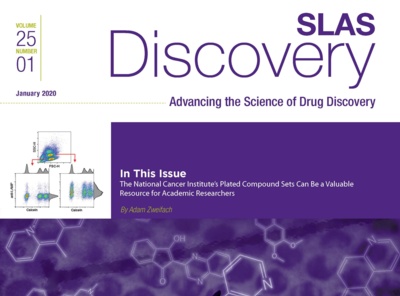
January’s edition of SLAS Discovery features an analysis of two plated sets of synthetic compounds available from the National Cancer Institute (NCI), and the author’s positive and negative results of using this type of collection in his lab’s research.
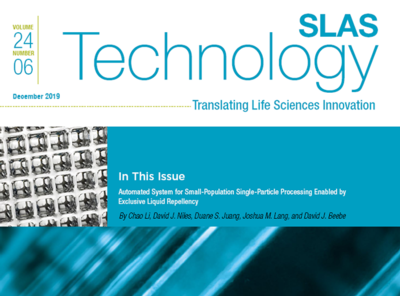
Next month’s SLAS Technology features the cover article, “Automated System for Small-Population Single-Particle Processing Enabled by Exclusive Liquid Repellency,” outlining research led by Chao Li, Ph.D., (University of Wisconsin-Madison, USA). In the article, Li and his team describe how they combined a robotic liquid handler, an automated microscopic imaging system and real-time image-processing software for single-particle identification to create an automated platform using exclusive liquid repellency (ELR) microdrops for single-particle isolation, identification and retrieval.
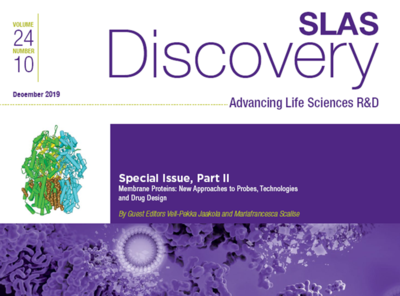
The December issue of SLAS Discovery features part two of the two-part special issue, "Membrane Proteins: New Approaches to Probes, Technologies and Drug Design." In this issue, Guest Editor Veli-Pekka Jaakola, Ph.D., (Confo Therapeutics, Belgium) includes a series of articles focused on new screening tools and assays that find new chemical matter for medically relevant membrane protein targets. In addition, an overview of a new and emerging protein-lipid reconstitution methodology methodology utilizing Styrene Maleic Acid (SMA) polymers is featured.
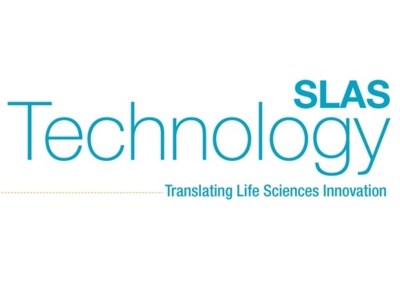
November’s SLAS Technology Auto-Commentary, "On the Way to Efficient Analytical Measurements: The Future of Robot-Based Measurements," highlights potentially suitable replacement measurement systems and processes as outlined in the book, Automation Solutions for Analytical Measurements: Concepts and Applications.

SLAS has selected 53 life sciences students to receive SLAS Tony B. Academic Travel Awards. Award winners will present their research at the SLAS 2020 International Conference and Exhibition in San Diego, CA, USA, January 25-29, 2020.
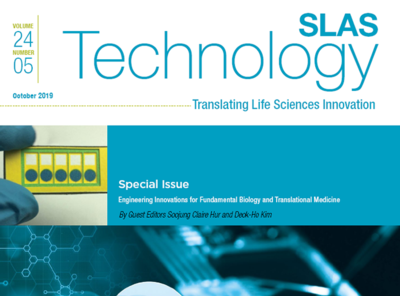
Oak Brook, IL – In the October Special Issue of SLAS Technology, Guest Editors Soojung Claire Hur, Ph.D., and Deok-Ho Kim, Ph.D., (Johns Hopkins University; Baltimore, MD, USA) introduce a collection of articles and reviews focused on the advancement in technologies that are playing a major role in shifting healthcare closer to more predictive, preventative and personalized medicine.
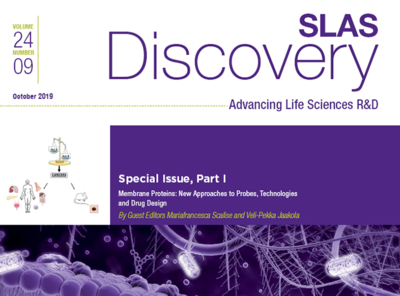
Oak Brook, IL – October's SLAS Discovery features part one of a two-part special issue on "Membrane Proteins: New Approaches to Probes, Technologies and Drug Design." Part two of this special edition will be featured in December.

Oak Brook, IL – In “Rapid Single-Cell Microbiological Analysis: Toward Precision Management of Infections and Dysbiosis” authors Hui Li, Ph.D., and Pak King Wong, Ph.D., (The Pennsylvania State University, PA, USA), Michael Morowitz, Ph.D., (University of Pittsburgh, PA, USA) and Neal Thomas, Ph.D., (Penn State University, PA, USA) describe their development of a novel technology approach designed to help clinicians better manage bacterial infection diagnosis and treatment, reduce the improper use of antibiotics and limit the spread of drug-resistant organisms.
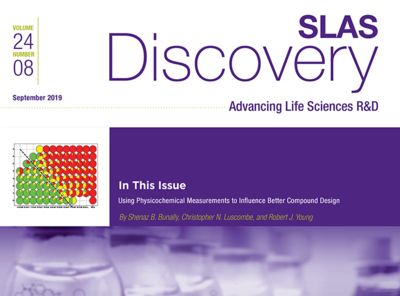
In September’s SLAS Discovery cover article, “Using Physicochemical Measurements to Influence Better Compound Design,” authors Robert J. Young, Ph.D., Shenaz B. Bunally, Ph.D., and Chris N. Luscombe, Ph.D., (GlaxoSmithKline) outline commonly used physiochemical properties and how they are assessed and measured throughout the drug discovery process, while also explaining the implications of each property that have led to flawed results. This review also offers suggestions on which contemporary methods can be used to improve subpar testing outcomes.
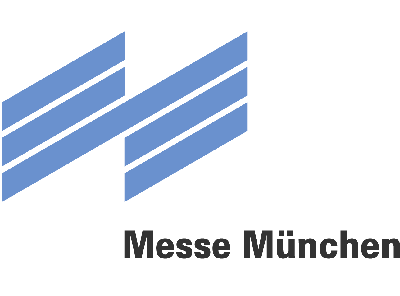
SLAS and Messe München Shanghai Co., Ltd., a wholly-owned subsidiary of Messe München in China, have announced a formally established a strategic partnership. SLAS will act as a supporter of the 2019 labtech China Congress hosted by Messe München Shanghai. SLAS will co-organize the SLAS Life Science Forum and jointly create the 200-square meter international Life Science Live Laboratory (Live Lab).
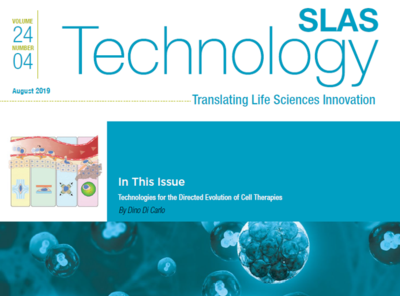
The August edition of SLAS Technology features the cover article, “Technologies for the Directed Evolution of Cell Therapies,” a review featured in the journal’s March 2019 edition. The research, led by Dino Di Carlo, Ph.D., (University of California Los Angeles) highlights how the next generation of therapies are moving beyond the use of small molecules and proteins to using whole cells.
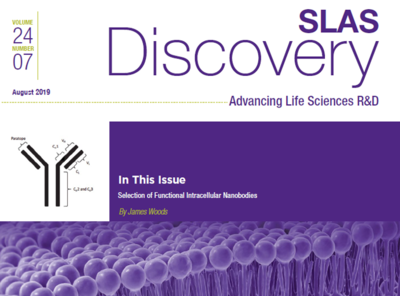
August’s edition of SLAS Discovery showcases research from James Woods, a fourth-year undergraduate student in biochemistry at Brigham Young University (BYU) (Utah). In “Selection of Functional Intracellular Nanobodies,” Woods describes current nanobody selection methods and focuses on those that ensure intracellular functionality. Nanobodies are recombinant antibody fragments derived from camelids that have a wide variety of potential uses.
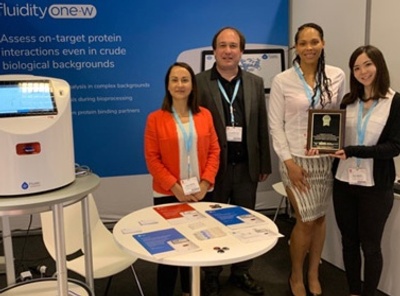
The Society for Laboratory Automation and Screening announced the winners of its annual New Product Awards at the SLAS Europe Conference and Exhibition held in Barcelona, Spain.

In a just-released SLAS Technology auto-commentary, “Peripheral Focused Ultrasound Stimulation (pFUS): New Competitor in Pharmaceutical Markets?” lead researchers on a recent study on noninvasive sub-organ ultrasound stimulation published in Nature Communications, highlight their use of focused ultrasound stimulation within peripheral organs to activate autonomic nerve circuits for its potential therapeutic effects.
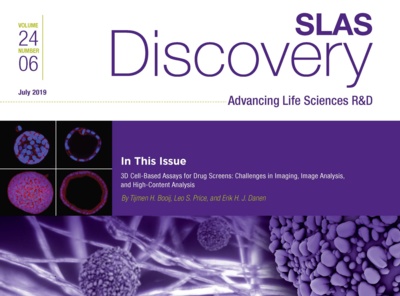
In July’s SLAS Discovery feature article Tijmen H. Booij, Ph.D., Screening Specialist for NEXUS Personalized Health Technologies (Switzerland), discusses the switch from using 2D to 3D cell cultures in drug discovery to more accurately mimic human physiological conditions and improve the success rates of drugs in the early stages of preclinical drug discovery.
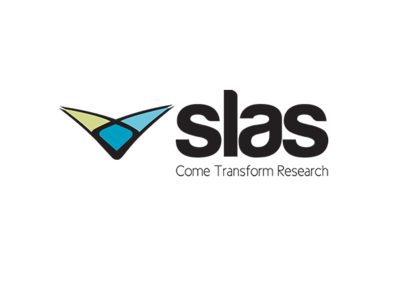
The Society for Laboratory Automation (SLAS) (Oak Brook, IL) and One Nucleus (London, UK) have teamed up to provide greater knowledge-sharing and connectivity opportunities to their members by collaborating on several in-person and online educational initiatives.
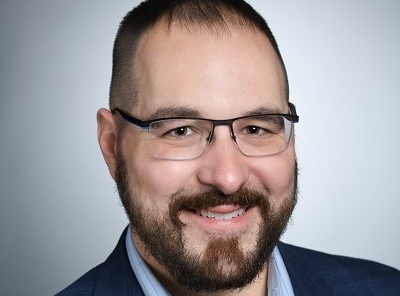
The recognition is part of the IUPAC’s 100th anniversary celebration and honors a diverse group of 118 outstanding younger chemists from around the world who embody the mission and core values of IUPAC including fostering worldwide communications in the chemical sciences and in uniting academic, industrial and public sector chemistry in a common language.
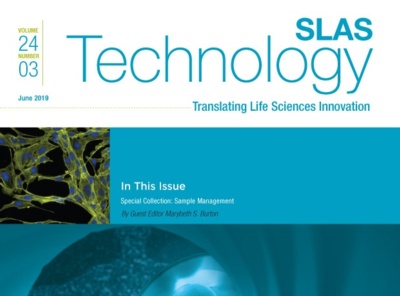
The June issue of SLAS Technology features the article, “Next Generation Compound Delivery to Support Miniaturized Biology,” which focuses on the challenges of changing the established screening paradigm to support the needs of modern drug discovery. The article also leads this special collection on The Science of Sample Management: Enabling Discovery from Bench to Clinic, based on content from SLAS 2018 Americas Sample Management Symposium.
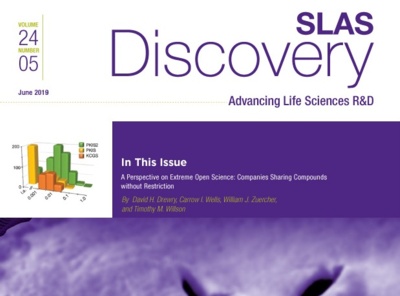
The latest SLAS Discovery issue features the cover article, “A Perspective on Extreme Open Science: Companies Sharing Compounds without Restriction” by Timothy M. Willson, Ph.D., (University of North Carolina and Structural Genomics Consortium), is now accessible through June 20.
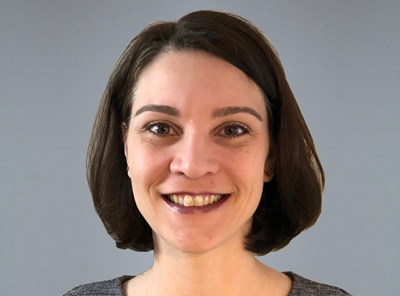
SLAS is pleased to announce the hiring of Christine Diedrich to the role of Publishing Manager. Diedrich will oversee all aspects of publishing for both SLAS’s peer-reviewed journals, SLAS Discovery and SLAS Technology, including planning, budgeting and operations.
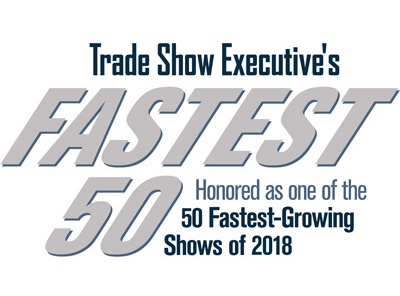
The 2018 SLAS International Conference and Exhibition has been recognized by Trade Show Executive Magazine as a recipient of its annual “Fastest 50” and “Next Fastest 50” Awards.
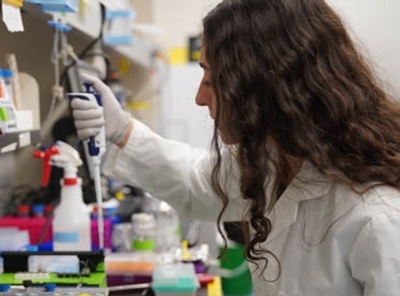
SLAS is honored to announce Carine Nemr, Ph.D. candidate from the University of Toronto (Canada), as the 2019 SLAS Graduate Education Fellowship Grant recipient. This is the fourth year the SLAS grant has been awarded and Nemr is the first recipient from Canada.
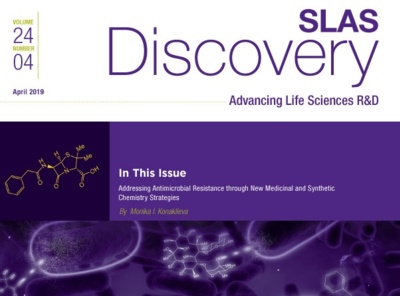
The April cover article of SLAS Discovery features “Addressing Antimicrobial Resistance through New Medicinal and Synthetic Chemistry Strategies,” by Monika I. Konaklieva, Ph.D., an online ahead-of-print article first published in December 2018.
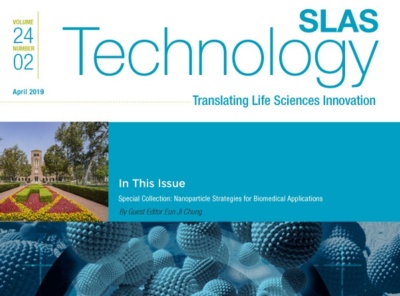
The April edition of SLAS Technology features a special collection of articles prepared by biomedical and chemical engineering students at the University of Southern California (Los Angeles, CA, USA) that illustrate the growing use of nucleic acids for gene augmentation.

In a new SLAS Technology auto-commentary the authors of “Analytical Measurements and Efficient Process Generation Using a Dual-Arm Robot Equipped with Electronic Pipettes,” highlight and discuss the main findings of their novel integration of electronic piston pipettes into an automation system using a dual-arm robot to perform liquid handling tasks similar to human operators.

The SLAS Discovery and SLAS Technology editors and editorial boards, in partnership with SAGE Publishing, announced their annual achievement award winners at a special reception at the SLAS 2019 International Conference and Exhibition earlier this month.
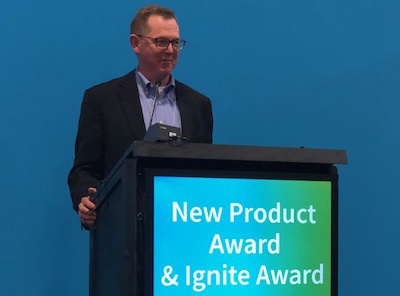
A full list of this year's SLAS2019 science and technology award winners is now available. Each year SLAS recognizes several award winners who represent the best of the Society's programs and mission. This year, eight awards and $15,000 in cash were given out.
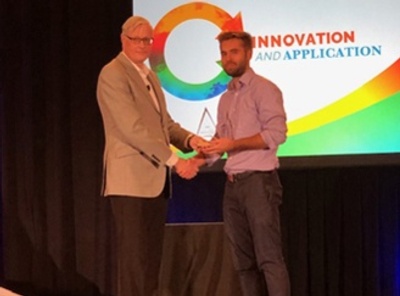
SLAS recognized Cristian Soitu, M.Eng. and Ph.D. Candidate at University of Oxford, with the SLAS Innovation Award at SLAS2019 International Conference and Exhibition in Washington, DC. Soitu received the award as recognition of his exceptional podium presentation on Microfluidic Chambers Using Fluid Walls for Cell Biology.
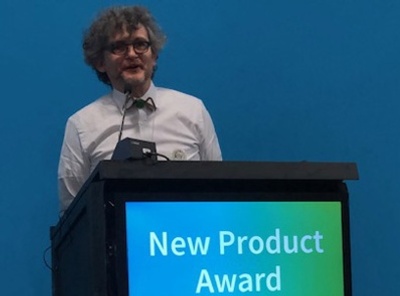
Three New Product Award winners were announced on Tuesday, February 5, at a special press conference held at the SLAS International Conference and Exhibition in Washington, DC.
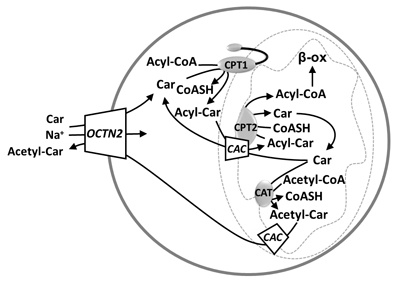
A new review by researchers from the University of Calabria (Italy) explores OCTNs, a small but intriguing group of transporters that are opening new frontiers in drug design research for improving drug delivery and predicting drug-drug interactions.
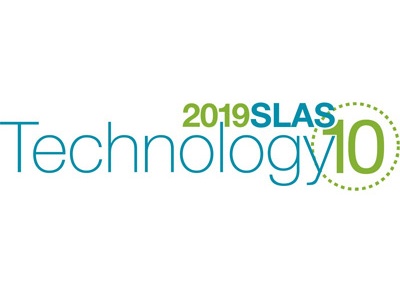
The SLAS Technology Ten annually showcases ten individual articles that stand out as the most innovative scientific achievements published in SLAS Technology in the past 12 months.
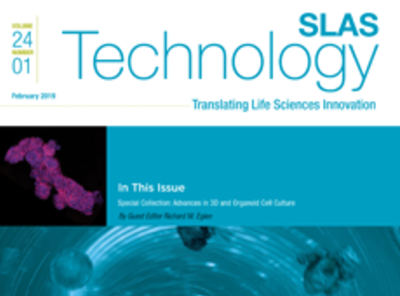
A new collection of reviews and original research articles in SLAS Technology illustrate how new technologies and advanced cell culture are accelerating basic research, drug discovery and drug development.
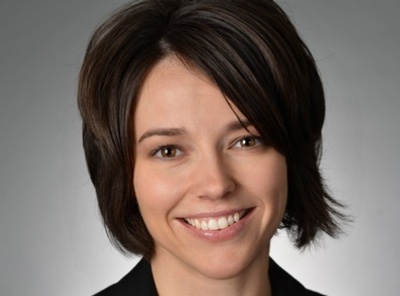
SLAS is happy to announce the promotion of Amy Wilkinson, CMP, to Director, Global Events. Wilkinson will direct the overall planning, management and execution of all of the Society’s educational programs, including two annual international conferences and quarterly topical and regional symposia.